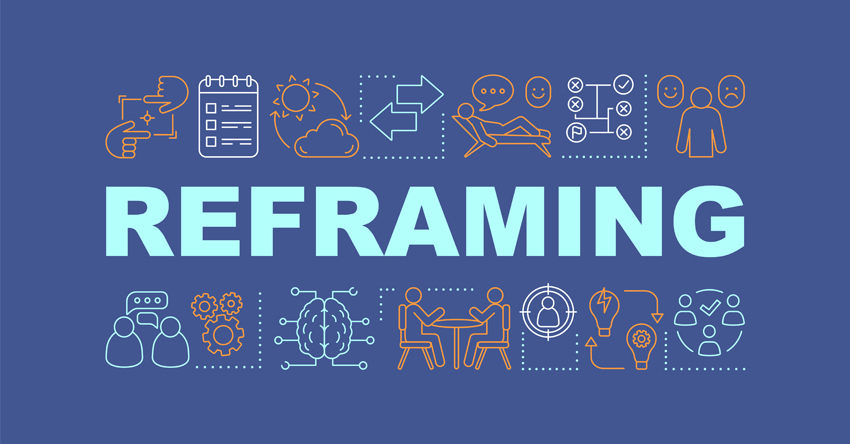Complete Communicator: To increase your impact, reframe your thinking
Complete Communicator: To increase your impact, reframe your thinking
By Jay Sullivan
The next time you have to share an update at a meeting, give an important presentation, or deliver a speech in front of a large audience, you’ll have more impact if you frame the conversation from the proper perspective. When we have to speak in a professional setting at work, we can only talk about one of three things.
We can talk about ourselves.
We can talk about our content.
We can talk to the audience about the audience.
Those are our only three options – ourselves, our content, our audience.
Well, nothing personal, but no one cares about us when we’re speaking. I talk in front of groups of lawyers, consultants, financial advisors, and other professionals multiple times a week. No one has ever come to a class for me. And no one comes to your meeting for you. Sorry.
They don’t care about our content either. Many of the lawyers I work with have carved out a niche in the law that is very specific and very valuable to their particular clientele. They become immersed in their specialty and the fascinating nuances of their narrow area of the law. We love our content. We’re steeped in it. Unfortunately, no one else cares about our content.
Rather, our audience cares about how our content impacts them, which is different from our content itself. So, the goal is to always talk to the audience about the audience.
Easy to say, but what does that mean in practice?
How to begin
Most people start talking at a meeting by saying,
“What I want to share with you …”
“What I want to cover today …”
“What I want to tell you about is …”
They start with, “What I want,” as if anyone cares what we want. Again, nothing personal but no one cares about what you want. Excise that phrase from your delivery. It’s not helpful.
Instead, start with, “What I thought would be most helpful to you today is …” When you start with that language, two things happen.
First, you’ve told your audience – be it one person or 100 – that you have put all your focus into what’s helpful to them.
Second, and more importantly, if you have the phrase, “helpful to them” running through your head before you even get in the conference room or on the Zoom call, you start challenging everything you’re about to share and the way you’re about to share it based on your only legitimate reason for being in the room, which is to be helpful to someone else.
And it’s not just a semantic difference. It’s substantive.
Becoming a strategic ally
Let’s say I walk into my partner’s office to give her an update on the Acme deal. Susan is busy. She is dealing with a dozen important topics. I walk in and say, “Susan, I want to give you an update on the Acme deal.” Susan is thinking, “Well let me drop everything I’m doing, Jay, because you want to give me an update on Acme.” All I am doing is interrupting Susan.
Instead, I should consider, “Why is this information helpful to Susan at this moment?” Then, I’ll knock on Susan’s door and say, “Susan, I think you have a call later today about Acme. I thought it might be helpful to you if I gave you a quick update on that situation.” Susan will be thinking, “Great. Haven’t had time to think about that yet. Come on in.” I’ve positioned myself as thinking not about me, but about Susan and her needs. I’ve become a more strategic ally to Susan in accomplishing her goals.
The same is true when we get on a call with a client. Starting a client call with, “We wanted to talk to you today about X,” can be very off-putting. If I’m your client, did I clear my calendar to meet your needs, or are you here to meet mine? Instead, make everything about meeting the client’s needs, not yours.
In addition, because you’ve now thought about why this is helpful to Susan, you’ve also thought about what jargon will resonate with her, what key facts are most important to her, and how she likes to receive information, meaning with lots of detail or just a high-level overview.
If Susan is a client rather than a colleague, considering the jargon issue is even more important. We all, regardless of our profession, spend more time talking to other people who do what we do, than people who don’t do what we do. That’s just the nature of work. If I’m a health care attorney or a litigator, I spend more time talking to other health care lawyers or litigators than I do talking to anyone else. As a result, we lose sight of what language is actually jargon and what is common parlance to an audience outside our narrow world.
We have all experienced this every time we have visited the doctor’s office. She or he starts rattling off our cholesterol numbers or blood pressure numbers or – most dreaded – BMI numbers, without telling us what the numbers mean or what the acronyms stand for. (So as not to commit the error I am addressing, “BMI” stands for “body mass index,” and these numbers are never good.)
Our doctors are smart people. They’re not being dismissive or condescending. They are just surrounded by other people who use the same shorthand. The same is true for us. Even your very smart client who is the GC of her company doesn’t have the same background as you. She grew into her role after spending her career as a litigator. She has limited exposure to M&A deals or employment law issues. Every time you use jargon applicable to those settings, you’re creating frustration and distance, and you’re not being helpful.
A more meaningful approach
Now extend that concept to when you have to speak at your firm’s monthly “lunch & learn.” Your topic, ostensibly, is about how your firm won the Beta case. Your instinct might be to title your presentation, “The Beta Case,” which is all about a case that is resolved and that no one in the room cares about.
You would be better served if instead you reflected on what you and your litigation team learned about the law as you managed your way through the Beta case. Then, your presentation title becomes, “Managing Important Nuances in Your Next Federal Securities Litigation.” The Beta case is just the lens through which you’ll share info that is actually helpful to your colleagues. I guarantee your audience will be more interested in your talk when the title itself is about them rather than your data.
In your upcoming meetings this week, note how often someone starts with the line, “What I want to share with you,” or worse, “Look, …” When you contribute your thoughts, start with, “What I thought would be helpful to you,” and notice if the tone of the meeting changes. You might be surprised.

Jay Sullivan is a former practicing attorney and the former managing partner at Exec/Comm, LLC, a communications consulting firm. He is the author of “The New Nimble: Leading in the Age of Change,” “Simply Said: Communicating Better at Work & Beyond,” and “Raising Gentle Men: Lives at the Orphanage Edge.” He can be reached at [email protected].
Share this story, choose a platform
Brought to you by BridgeTower Media
Free Weekly Newsletter
Recommended content
The Firm Playbook: Burnout and bottlenecks: You can’t have one without the other
The Firm Playbook: Burnout and bottlenecks: You can’t have one without the other By Nermin Jasani Burnout and bottleneck, these [...]
Effective marketing ideas for small law firms in 2026
Among the experts’ tips: Highlight client testimonials and “niche down.” Read more @ attorneyatlawmagazine.com
Why law firms can’t afford to ignore working parents
Strong parental leave policies are good in the long run for parent-lawyers, their colleagues, and their firms. Read more @ [...]
3 smart business development tips for 2026
For most lawyers, existing clients and old contacts may be better for developing business than beating the bushes for new [...]






